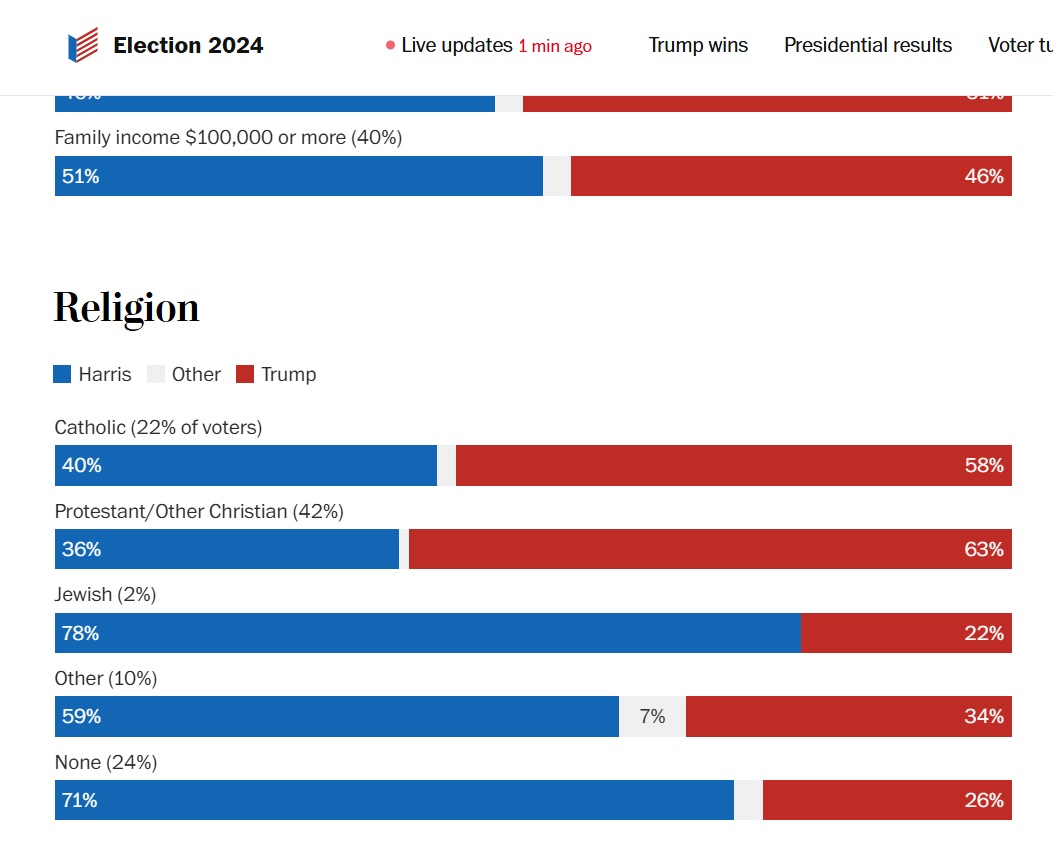(ZENIT News / Rome, 11.07.2024).- In a notable shift from the 2020 presidential election, Donald Trump has surged in popularity among Catholic voters, capturing a significant 15-point lead over Vice President Kamala Harris in the 2024 election, according to The Washington Post’s exit polls. With 56% of the Catholic vote compared to Harris’s 41%, Trump’s 2024 advantage marks a substantial 10-point swing since the last presidential race, when he led by only five points against then-President Joe Biden.
This trend represents a shift in Trump’s appeal within religious demographics, which has proven decisive in the latest election. Protestants and other Christian groups, who comprised 42% of the electorate, also leaned heavily in Trump’s favor, giving him 62% of their support. In contrast, Harris found strong support among Jewish voters, capturing 79%, and those with no religious affiliation, who favored her by a 72% to 25% margin.
Catholic Vote Deeply Divided on Abortion and Immigration Policies
The exit poll also exposed a stark divide in how Catholic voters prioritize issues. While a significant 61% of Catholic voters expressed support for legal abortion in most cases, Trump still managed to win a substantial portion of this group, securing 28% of voters who believe in legal abortion. Conversely, he held an overwhelming 90% of those who advocate for abortion restrictions, reflecting his appeal among conservative Catholics on this issue.
On immigration and economic issues, Trump held a decisive advantage, with 57% of Catholic voters placing more trust in him to handle immigration policy, a 25-point lead over Harris. Economic policy also saw Trump favored by Catholics, with 55% expressing confidence in his approach versus 36% for Harris.
Regional Patterns in Key Swing States
In ten critical swing states—including Florida, Pennsylvania, and Wisconsin—Trump’s lead among Catholic voters held steady at 15 points, mirroring the national average. White Catholics, who made up 15% of the electorate in these states, leaned even more heavily toward Trump, with 60% backing him over Harris’s 37%. This consistent pattern in crucial battleground states suggests that the Catholic demographic was a pivotal factor in Trump’s electoral performance.
Changing Perceptions of Extremism Among Catholic Voters
Catholic voters expressed divided concerns over extremism within both campaigns. While 59% feared Harris might adopt overly radical policies, 58% felt similarly wary about Trump. The poll indicated that for 73% of Catholics, voting was more about supporting their chosen candidate than opposing the other, highlighting an alignment with Trump on core issues rather than simply an aversion to his opponent.
These results mark a profound shift in the religious landscape of American politics, particularly among Catholics, who now demonstrate an increasing inclination toward Trump’s policy positions on immigration, economic stability, and conservative values—factors that appear to outweigh other ideological divides within the community. Whether this represents a lasting realignment or a response to specific policy stances remains to be seen, but the data underscore the evolving role of faith-based voting blocs in shaping American elections.
Thank you for reading our content. If you would like to receive ZENIT’s daily e-mail news, you can subscribe for free through this link.




